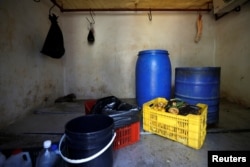Some 50 animals have starved to death in the last six months at one of Venezuela's main zoos, according to a union leader, due to chronic food shortages that have plagued the crisis-stricken South American nation.
The fatalities at the Caricuao zoo in Caracas include Vietnamese pigs, tapirs, rabbits and birds - some of whom had not eaten for two weeks, according to Marlene Sifontes, 52, a union leader for employees of state parks agency Inparques which oversees zoos.
Other animals are at risk across the country.
Their troubles mirror those of Venezuelans who routinely skip meals or spend hours in supermarket lines, at times chanting "We want food!" or even looting, amid an unprecedented economic downturn in the OPEC nation.
"The story of the animals at Caricuao is a metaphor for Venezuelan suffering," said Sifontes.
Authorities have not given numbers, but state prosecutors have opened an investigation into the deaths of "various species of wildlife" at the zoo.
Currently, lions and tigers at the Caracas zoo are being fed mango and pumpkin by anxious staff to make up for reduced rations of meat, while an elephant is eating tropical fruit instead of its usual diet of hay, the union leader said.
The zoo's management declined comment.
President Nicolas Maduro blames the country's problems on an "economic war" waged by local opponents and the United States.
His critics say heavy reliance on oil, the price of which has fallen steeply, and unsustainable economic policy are to blame.
As with all shortages in Venezuela, the situation for zoos is worse outside the capital, though wardens are looking for ways to keep animals alive.
In La Laguna, a park in the western state of Tachira, administrators said they had to seek donations from local businesses to get fruit, vegetables and meat for the animals.
"We are doing all that is humanly possible to ensure the zoo continues to function," said Oslander Montoya, an accountant for the local municipality which handles funding for the zoo.
Three animals died in May at a zoo in Paraguana, on the northwestern Falcon peninsula, the director said.
Staff there are planning to move a dozen animals, including vulnerable spectacled bears, to another park in the Andean state of Merida. The zoo's six bears are currently eating just half of their required 16 kilograms (35.2 pounds) of food every day.










